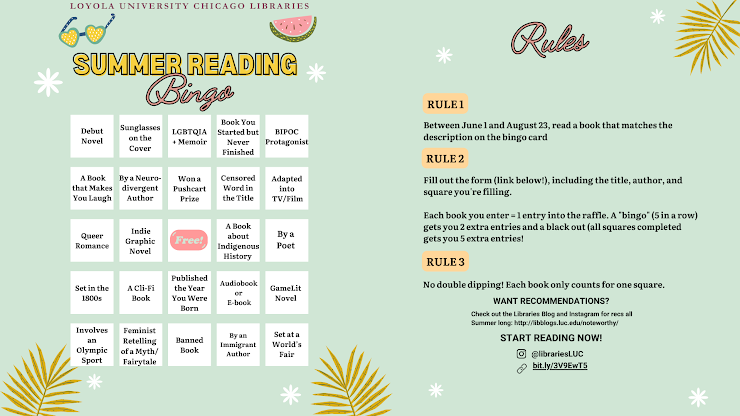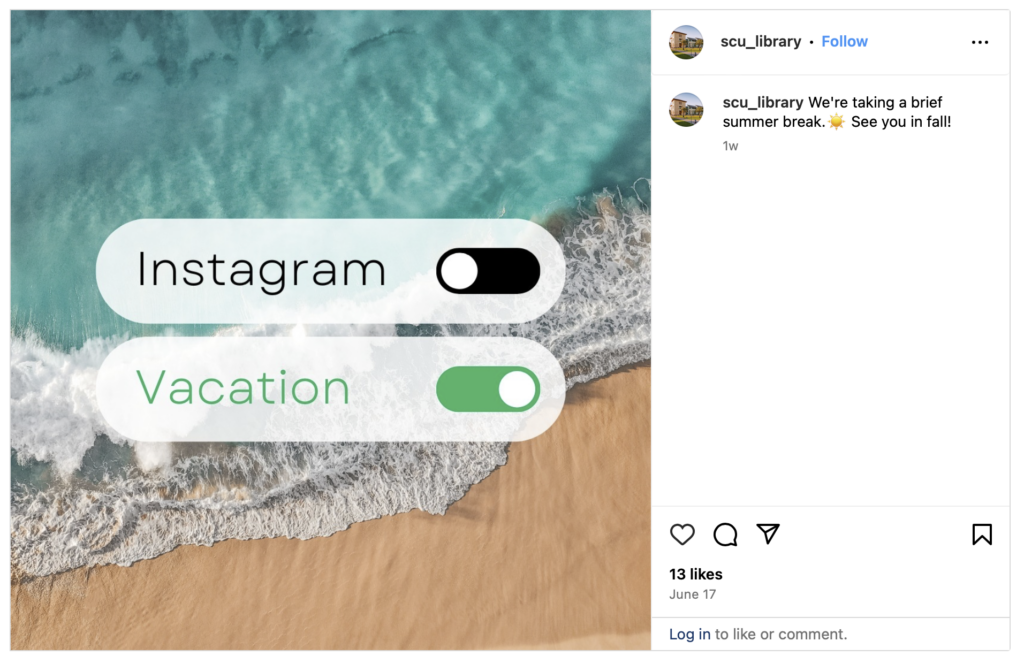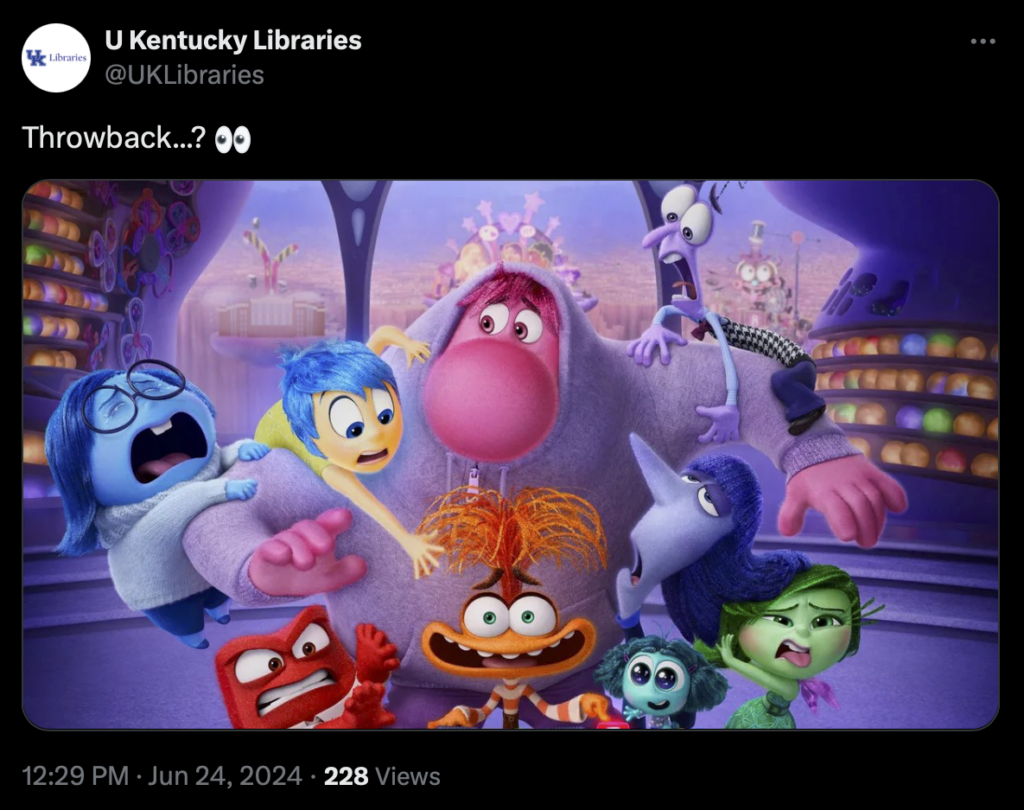I almost didn’t get this post out in time. Earlier this month, my family and I traveled to Portland for a week. I thought I had tied everything up before we left, but turns out I missed closing the loop on a couple key projects. But rejoice! Those are done now. So without any more delay, here’s what happened in academic libraries in June.
News and announcements
The University of Washington Libraries hosted a student video contest. The 2024 edition of their #IHeartUWLibraries contest asked students to create original videos showcasing the libraries through the lens of their experience. The top prize of $1,500 was awarded to the creator of this video (above).
A GIS librarian at UNC Libraries teamed up with an art historian to create an interactive map of local art galleries and exhibit spaces as part of “Loving Your Local Art Scene” summer class. I can’t not love the final paragraph: “We need to hire more librarians, give them better budgets and storage, and support any archival process they think they need to invest in. Librarians are the unacknowledged champions of the research process.” Amen!
At my place of work, we frequently talk about ways we can foster a culture of reading among undergraduate students. To that effect, Loyola University Chicago Libraries is hosting summer reading bingo. Students are encouraged to read in a variety of categories, such as queer romance, poetry, banned books, and books “published the year you were born.”

Off-site and high-density storage facilities for libraries provide engaging ways to talk with students and faculty about the role of libraries in preserving human knowledge and how to continually grow their collections. UC Berkley Library recently wrote about their tour of the Northern Regional Library Facility for their legacy/estate donors group.
I’m amazed at the complexity of this seemingly all-staff library assessment project (aka “data party”) from Duke Libraries. Every two years, they run a large student satisfaction survey. Small teams of staff code thousands of comments to create dashboards. Then more than 50 staff dig into the results and brainstorm solutions to address the problem areas uncovered by the survey. The recommendations are then presented to library leadership, who then parcel out the next actions.
Speaking of library assessment, what does that have to do with bird watching? Well, Temple University Libraries has an answer for you.
On social
Every social media manager should have the agency and opportunity to take a social media break. I love how Santa Clara University Library [Instagram] made their announcement.

University of Wyoming Libraries [Instagram] created a video offering highly specific book recommendations.
UTA Libraries [Instagram] has a super profresh Reel about how they support experiential learning.
Grand Valley State University Libraries [TikTok] has a Black book exchange in a Little Free Library posted near their building.
If you’ve been on X/Twitter for a while, you might remember 2023 when UK Libraries [X] was photoshopping their building into famous images daily (for 365 days!). This week they posted a throwback in conjunction with Inside Out 2. I am always impressed when library creators commit to the bit.

Interesting events and exhibits
Michael Flierl, an associate professor and student learning librarian at The Ohio State University Libraries hosted a virtual presentation on future considerations for artificial intelligence and information literacy, including questions about the role of librarians in all of this.
“Let’s engage in historical capitalism!” The Virginia Tech University Libraries hosted a workshop entitled, “Archival Adventures: Decades of Advertising in Pulp Magazines.” Archivist Anthony Wright de Hernandez explored advertisements in speculative fiction magazines. The event was live streamed on Twitch (cool) and is part of a weekly series.
Penn Libraries hosted their first Death Cafe earlier this month. Distinct from bereavement support, counseling, or therapy, Death Cafes are an opportunity to talk candidly and openly about death and dying. And there’s cake!
They might be old school, but I love a good book display. Duke University Libraries created a “Read like a Celebrity” display that included titles mentioned by celebrities in interviews or on social media.
Next week, Yale Library will host its annual public reading of the Declaration of Independence and the oration by Frederick Douglass in which he asked: “What, to the American slave, is your Fourth of July?” The event runs 90 minutes and is not live-streamed, but from what I can gather from the website, it’s a popular event!
Notable mentions
- The University of Delaware Library on photographing architectural history.
- UC Davis Library provides an update on its strategic plan progress.
- Also at UC Davis Library, remembering Napa winemaker Warren Winiarski.
- The University of Louisville Libraries won an ARLIES film award.
- The Jean & Alexander Heard Libraries at Vanderbilt has digitized the papers of the civil rights leader Rev. James M. Lawson.
- Southern Methodist University Libraries offers a neat and succinct digital collections update.
- IU Libraries has an article on provenance, paleography, and planetary motion.
- Washington University St. Louis studies the salacious.
- Emory University Libraries provides an assessment update on its summer internship for underrepresented communities.
- University of Michigan Library has a seed vending machine!
- Carnegie Melon University Libraries has launched an exhibit featuring the four folios of Shakespeare.
- University of Miami Libraries has a student current exhibition on Jackie Gleason.
Pride and Juneteenth inspired a number of libraries to post about recommended readings, LibGuides, and special collections materials. Here are two quick roundups of some examples from across the field.
- Pride Month: Michigan Tech, University of Virginia, Villanova, Emory (and also Emory), Fordham, Indiana U. Bloomington, University of Utah, University of Vermont, and UCLA
- Juneteenth: University of Florida, DePaul, Penn Sate, Villanova, Touro College, and University of Washington
That’s it for this month! Do you find this useful? What would you like to see next time? Let me know in the comments!
